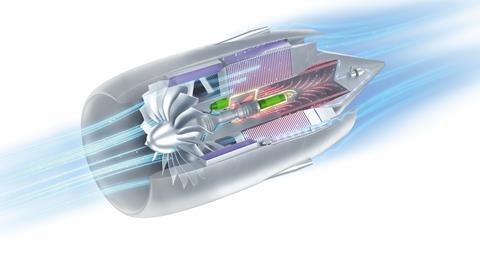Germany’s MTU Aero Engines is to adapt its contribution to the EU Clean Aviation-funded SWITCH project to focus on heat-recuperation rather than steam-injection technology as previously planned.
Project leader MTU says it has discussed the change in its contribution with Clean Aviation “and have received the green light”.
“We have also agreed to extend the first project phase by one year to the end of 2026.”

SWITCH – or Sustainable Water-Injecting Turbofan Comprising Hybrid-electrics – is a research project looking at potential technologies to boost the efficiency of a second-generation geared turbofan (GTF) engine. Commencing in January 2023, it was originally due to run until the end of 2025.
Alongside MTU, the project involves engine maker Pratt & Whitney and sister company Collins Aerospace, which are driving the hybridisation of a PW1100G engine through the addition of electric motor-generators to the high- and low-speed spools.
These hybrid elements were to be combined with MTU’s Water Enhanced Turbofan (WET) engine concept, which was to use a steam generator to evaporate water and inject it into the combustion chamber.
In addition to boosting the engine’s efficiency, MTU also predicted significant cuts to NOx production and contrail production from the WET concept.
However, the propulsion specialist disclosed earlier this year that it was discontinuing its research into the technology, which had been ongoing since 2022.
“The results so far show that the desired fuel savings cannot be fully realised. In contrast, the advantages in terms of NOx and contrail reduction were confirmed,” it says.
“Overall, this means that we will make adjustments and refinements to the revolutionary gas turbine – in close collaboration with our national and international research partners. The main focus remains on using exhaust gas heat to improve overall efficiency.”
MTU says it is too early to comment on the technical details of the revised SWITCH architecture, although the P&W/Collins contributions remain unchanged.
“We are currently working on the technological details, but we still need a little time,” it says.
“Our goal is and remains to identify and develop the most competitive concept for a second GTF generation.”
MTU says its work will continue until the end of 2026 “also with a view to a subsequent joint second phase”, within Clean Aviation.
Airbus is likely to offer its A380 as a flying testbed for the powerplant should it proceed to a follow-on stage.































